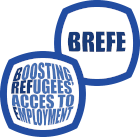Testimonies
Three types of testimonies are presented: stories of refugees, integration paths seen from the professionals' point of view and initiatives told by the people who implement them. They show that a successful professional integration requires the joint involvement of several actors. They can be accessed either directly or by keywords.
How part-time traineeship can be a quick access to acquisition of language skills and employment
Migrants’ poor Italian knowledge in a company requires a strong commitment by the employer, such as use of a vehicular language, use of interpreters/mediators, translation of safety information, manuals, organization of peer-groups, learning investment, etc. Few employers are ready to such an investment. Yet the practice confirms that learning a foreign language is easier when the learner is placed in a working context where s/he can practice language skills and receive constant and stimulating feedback. For this reason language courses should be combined with part-time employment.
It is the case of the Italian company Pasta & Company Group, 60 employees, working in the food industry. They have a long and excellent story of hiring new immigrants and refugees with a low level of Italian. They started in 2003 with Romanian workers (when Romania was a non-EU country) achieving excellent results and thus replicating the good practice with African migrants/refugees in the following years. Since 2015 they have been recruiting with permanent employment contract more than six workers coming from Benin, Congo, Ivory Coast, Gambia, Togo. The working involvement of migrants starts with a six-month paid internship with a part-time schedule (in most cases remuneration for the first three months is covered by the inclusion training paths, while the last three months are paid by the company itself). The part-time work commitment allows them to attend a formal Italian course while they are not at work. After the internship, those being under 30 are hired with an apprenticeship contract, which has a strong compulsory training component; so they can benefit from the training hours provided by the contract, also for the improvement of Italian.
Immigrants are included in all production phases: washing of raw materials, cooking and felling, mixing and processing of pasta, up to the pasteurization and final packaging. Different tasks are assigned on the basis of their respective skills, level of literacy and ethics: those with higher literacy can be assigned to labelling; Muslims are not assigned to meat processing, to prevent problems. Until today it has not been possible to assign any of them to commercial tasks, because these positions require high mastery of Italian and excellent soft skills, which they lack.
In the company experience, immigrant/refugee workers are an example to other employees, for the willingness and self-denial they devote to work; so their integration has a positive impact on the business climate and productivity.
The main features of the success of Pasta & CO are:
- combining part-time work commitment with language learning,
- remuneration during the traineeship,
- assignment of tasks on the basis of workers’ ethical values and competences,
- task-rotation (workers can try different tasks and learn more competences),
- workers’ autonomy in organising work shifts.

How to teach technical skills and specific language on-the-job
Symposium Osteria Enoteca, a restaurant and wine tavern, is a micro company made up of young, motivated personnel who are attentive to diversity management policies.
They recently hired a Kurdish refugee as assistant cook. The insertion of a foreign worker was not properly sought, but it happened in a rather random way, through a personal contact with a local charity organization, which presented the candidate. He was placed because of his soft skills and previous cook experience. The guy started to work on traineeship (with the salary paid by a local Foundation) and was then employed with a permanent working contract.
The main problems faced by the company were related to language and culture differences: the guy did not know the Italian technical language (names of ingredients, tools, verbs related to the art of culinary) and did not know how to prepare the courses, not having any experience on Italian food, traditions, recipes and tastes. So it was necessary to teach him technical language and professional information on-the-job. Several simple techniques were used to help him improve his technical Italian: adhesive strips with the Italian name of tools were stick on the wall and kitchen equipment/furniture; photos made and saved on mobile phones with specific labels; all work processes were repeated aloud by native colleagues with emphasis on the names of objects and verbs used; the preparation of the recipes was accompanied by the story of local tastes and culinary traditions; continuous corrective feedback was given and in case of need English was used as a vehicular language. The Italian staff used listening and dialogue based on mutual respect. This generated a bond of trust and collaboration that made the difference. This way of relating produced significant added value by improving the business climate and encouraging the work team to work together to solve problems by taking on the task as a team.
Symposium does not explicitly adhere to CSR models, but it operates in a socially responsible manner in an unconscious way. It is inspired by principles of genuineness with respect to the quality of products in relation to both food and wine. It does not make distinctions of origin or gender: people who need and want to work, who are motivated and willing to learn, willing to commit themselves and serious are well received. The success story of this micro company teaches that soft skills and motivation may be more important than technical ones and language and communication problems may be solved with a good deal of creativity and patience.

